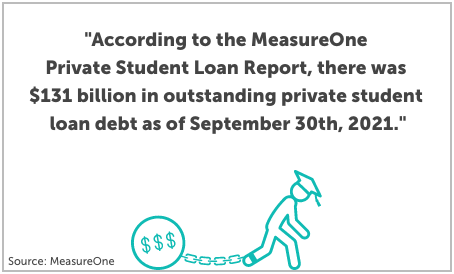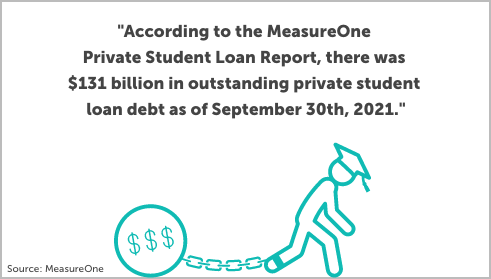To get ahead in life, many people choose higher education. But for most American families, this also means taking on student loans. But what happens to these student loans after death? Does your family have to take on the responsibility of paying it all back?
In many cases, student loans are discharged (canceled) after death. But not in all cases. Read on to learn more about what happens to unpaid student loans after the death of a borrower or cosigner.
Table of Contents
- What Happens to Student Loans When You Die?
- How to Report a Death to a Student Loan Servicer
- Tips to Protect Your Family From Inheriting Your Debt
- Student Loans After Death FAQs
Learn how you can use term life insurance to ensure your loved ones aren’t saddled with your debt when you die.
What Happens to Student Loans When You Die
Two different types of student loans are available: private student loans and federal student loans. How the unpaid balance is handled when you die is different for each one.
Private Student Loan Debt
Private student loans are offered through private lenders rather than the federal government. These lenders can include banks, credit unions, universities, etc.
To qualify for a private student loan, you typically need a steady income and a good credit score or cosigner. Most students won’t yet have eligible income or credit history, so they often need a cosigner instead. A cosigner is a person who agrees to cover the loan balance if you, the borrower, cannot.


In 2018, the Economic Growth, Regulatory Relief, and Consumer Protection Act was put into law. Before that, cosigners on private student loans were responsible for the loan balance if the borrower died. Since the bill was passed, cosigners are no longer responsible for private student loan debt if the borrower passes away.
What happens to private student loan debt when you die?
- If the loan was issued before 2018 and there is a cosigner, they are responsible for the unpaid balance.
- If the loan was issued after 2018 and there is a cosigner, their obligation is released.
- If you have no cosigner, it may be forgiven or become part of your estate. It depends on your lender’s death discharge policy.
- If the cosigner dies, but the student borrower is alive, many private student loans automatically default, and your loan balance will be due immediately.
- If you’re married and live in a community-property state, a surviving spouse may become responsible for their deceased spouse’s private student loan debt if it was acquired during marriage.
What happens to my parent’s private loan debt if they die?
If parents take out personal loans to pay for your college education and pass away, the unpaid balance becomes part of their estate. Probate court decides how the balance is paid. The loan is not discharged.
Federal Student Loan Debt
Fortunately, federal student loans provide death discharge guarantees. If you, the student borrower, die, your survivors can apply for a death discharge to cancel your loans.
What happens to my parent’s PLUS loan debt if they die?
Parent PLUS loans are federal loans. Students will not become responsible for parent PLUS loans.
If the parent borrower dies, the PLUS loan can be discharged. However, if both parents are named borrowers on the loan, then the death of just one parent will not discharge the loan. The surviving parent is still responsible for payment.
If you, the student, die, your parent’s PLUS loan will be discharged.
How to Report a Death to a Student Loan Servicer
A student loan servicer handles billing and answers questions regarding student loan repayment. A family member or another representative must contact the student loan servicer and provide proof of death in the form of a death certificate copy.
Tips to Protect Your Family From Inheriting Student Loan Debt
Student loan debt can be a hefty burden. Even more burdensome for those who inherit this debt unexpectedly.
The following steps can help you protect your loved ones from becoming responsible for your student loan debt.
Read Death Discharge Policies Before Taking Out Loans
Need to take out private student loans? Death discharge policies can vary between lenders. Look for lenders willing to discharge the debt upon the death of the student borrower and cosigner.
Share Your Loan Information With Your Family
Write down your student loan account number and the contact information of your loan servicer. Keep this information with your other important financial documents and share the location with your family. Having this information handy will make things easier for your parents or spouse if you die.
Consider Refinancing
If your current private lender does not have satisfactory discharge policies, consider refinancing with a different private lender. Additionally, financing private student loans may save you money in the long run if the new lender offers a lower interest rate.
Get Life Insurance
One of the best ways to protect loved ones from struggling to pay off your debt if you die is to get life insurance.
Benefits of life insurance include:
- Term life insurance is affordable, especially if you’re young.
- Life insurance avoids probate, so your beneficiaries get the money much sooner.
- Your creditors cannot come after life insurance death benefits paid directly to a beneficiary.
- Life insurance death benefits are income tax-free.
- Life insurance death benefits can be used however the beneficiaries wish.
Whether you have credit card debt, medical bills, car loans, a mortgage, or private student loans, owning life insurance can financially protect your loved ones when you die. If you die with debt, even if your loved ones don’t inherit it, the balance will come from assets in your estate. Without life insurance, your heirs may end up with nothing except a funeral bill.
If you’re a parent who has cosigned private loans for your child and you pass away, many lenders want the loan paid off immediately. Get life insurance to protect your child’s finances. Your child can use the death benefit to pay off the loan.
If you’re a student with private student loans, consider getting life insurance to protect any cosigners. Alternatively, your cosigners (usually parents) could take life insurance out on you to protect their finances.
If you’re married, life insurance will help your spouse pay off any debt they inherit from you.
See what you’d pay for life insurance
Student Loans After Death FAQs
We know getting a college education is important, and we also understand how confusing student loans can be. Here are answers to some common questions.
What Happens if a Cosigner on a Private Loan Dies?
Death discharge policies vary by lender. Some lenders will discharge (or cancel) a loan if the cosigner dies.
For others, a cosigner’s death means the loan goes into automatic default. Automatic default means the remaining balance on the loan comes immediately due, even if it’s in good standing.
This can be shocking for the student and throw them into an impossible financial situation. It’s one of many reasons parents should have life insurance to protect their children.
What Happens if a Cosigner on a Federal Loan Dies?
Most people don’t need a cosigner for federal student loans. The rare case would be if a graduate student or parent applying for PLUS loans has a poor credit history and needs an “endorser.” If the endorser dies, the primary borrower is still responsible for paying the loan.
Is My Spouse Responsible for My Student Loan Debt When I Die?
It depends. Usually, you’re not responsible for your spouse’s student loan debt.
- If you marry someone with student loan debt, their debt remains theirs, and you won’t be responsible if they die.
- If you live in a community-property state and they take out student loans while you’re married, you will likely be responsible for paying it back if they die. (Note: These states do not have uniform laws. Learn more about community-property states here.)
- If you cosign on private student loans for your spouse, you may be on the hook for repaying them if they die. It depends on the lender’s death discharge policy.
Will My Family Pay Taxes on My Discharged Student Loans if I Die?
No. With the passing of the 2017 Tax Cuts and Jobs Act, student loans discharged due to death or disability are exempt from federal taxes.
Get a Term Life Insurance Quote. Protect Your Loved Ones.
American households carry a frighteningly large amount of debt. Imagine losing a loved one, grieving, and suddenly learning you’re on the hook for thousands of dollars of unexpected debt.
Life insurance protects financial futures. Term life insurance is customizable and can fit into most budgets.
When shopping for term life insurance, choose a term length that will financially protect your family until your debts are paid off. For most people, their largest loan is their mortgage. For example, if you have a 30-year loan with 25 years left, then get, at minimum, a 25-year term policy.
Don’t wait. Getting a quote is easy and applying online only takes a few minutes. There is no obligation to buy. But when you learn how little it costs to protect your family’s future, you’ll wonder why you didn’t get it sooner. Get an instant term life insurance quote today.
Note: Information regarding student loans and tax law is current as of January 2023. Government laws can change, which may impact the protections of the 2017 Tax Cuts and Jobs Act and the 2018 Economic Growth, Regulatory Relief, and Consumer Protection Act.


… or you can send your kid to college in Europe or Canada for free or a tiny sliver of the price. I started researching this when my kids university wanted 44,000 bucks for a semester in London. So, I check to see how much it would be if we just signed up ourselves at the same university, and she took the same exact classes… 3,000. Yup, 41,000 less for one semester. I wish I learned this 100,000 bucks ago when I made the mistake of sending my first kid to an American University. The loan is in my name only. I would never pay extra for a life insurance policy, they get what they get.
Hi Kat, thank you for your comment about the expense of university. Unfortunately I don’t have the expertise to discuss strategies for lowering international tuition for college students, although what you mention sounds interesting.
When it comes to buying life insurance to cover student loans, you are correct in that it is not a necessity. Sometimes student loans are forgiven upon death, but sometimes they are not. It is important to read through the contract to understand the details of your loan. There are many circumstances where young married couples both have student loans that are already crippling their finances, and the loss of either one of them will bankrupt the other. So not only do they lose the love of their life, they lose everything they have worked for up to that point. Life insurance is an important product for these families.
Parents also are co-signers on loans for children, and if that loan rolls up to the parents, they may or may not have the ability to pay it off. This can devastate the parent’s retirement. Parents are not supposed to bury their children and life insurance is meant to mitigate the financial stress if their child has student loans that the parents are ultimately responsible for.
I have a friend who lost her only child about a decade ago. This was the most traumatic moment in her life, and still continues to be to this day. The pain and suffering of losing a child is something no one should ever have to go through. Life insurance is only a financial solution for that kind of tragic loss. But without it, a family may continue to suffer for years onwards in a financial capacity on top of the emotional and spiritual loss.